As an Australian Immigration Law Firm, we understand how daunting the prospect of a visa cancellation can be. It’s a complex area of law with serious consequences. This article aims to shed light on non-character-based visa cancellations in Australia, helping you understand the common grounds for cancellation and the relevant legal framework.
A visa can be canceled for many reasons, some of which are not related to a person’s character. These cancellations often stem from issues with the visa application itself, or from failing to adhere to visa conditions after it’s granted. The consequences can be significant, potentially leading to detention and future visa application bars.
Common grounds for non-character-based visa cancellation include:
- Providing incorrect information or bogus documents in your visa application.
- Breaching a condition of your visa, such as working more hours than permitted on a student visa.
- Failing to meet the requirements of your visa, like a student not meeting the course requirements or a business visa holder not establishing a business.
- Your sponsor not meeting their obligations.
These are distinct from character-based cancellations, which are typically related to criminal activity or a risk to the Australian community.
The Power of Visa Cancellation: Sections 109 & 116
The main provisions for non-character-based cancellations are found in the Migration Act 1958. Two key sections are particularly relevant:
- Section 109: Cancellation for Incorrect Information. This section gives the Department of Home Affairs (DHA) the power to cancel a visa if it’s found that the visa holder provided incorrect answers or bogus documents in their visa application. This can be a simple error or a deliberate act, as the provision applies whether or not the non-compliance was intentional. The consequences can be severe.
- Section 116: General Power of Cancellation. This is a broad discretionary power that allows a visa to be canceled for various reasons. Common reasons for a Section 116 cancellation include failing to comply with visa conditions, a change in circumstances since the visa was granted, or if the visa holder’s intentions for coming to Australia no longer exist. When considering a cancellation under this section, the DHA must weigh a range of factors, including the hardship caused to the visa holder and their family and the visa holder’s history of compliance.
What Happens After a Cancellation?
If your visa is canceled, you will be notified and given an opportunity to respond. This is a critical stage, as your response can influence the final decision. The Notice of Intention to Consider Cancellation (NOICC) will outline the reasons for the proposed cancellation and invite you to provide comments.
If your visa is canceled, the consequences can include:
- You may become an unlawful non-citizen and be liable for mandatory detention.
- You may face bars on future visa applications, such as the three-year ban under Public Interest Criteria (PIC) 4013 for a visa condition breach.
- If your visa was canceled due to providing false information or bogus documents, you may be subject to a three-year exclusion period under PIC 4020.
This is also a vital time to understand your review options. In most cases, you can apply for a merits review with the Administrative Appeals Tribunal (AAT). The type of visa and the specific cancellation power used will determine which division of the AAT can review your case and the timeframe in which you must lodge your application.
Understanding Consequential Cancellations
One of the most concerning aspects of a visa cancellation is the potential for consequential cancellations under Section 140. This provision allows for the cancellation of visas held by family members or other dependents of the primary visa holder whose visa has been canceled.
This can happen automatically in some cases or at the discretion of the DHA. The DHA will consider factors such as whether there are Australian children involved or if there are compelling or compassionate circumstances that outweigh the reasons for cancellation.
Navigating a visa cancellation is a complex legal process with high stakes. If you or a loved one are facing a visa cancellation, it’s crucial to seek expert legal advice immediately. An experienced migration lawyer can assess your case, prepare a compelling response to the DHA, and represent you in a review if needed.
Disclaimer
The content of this article is for information purposes only. Whilst every effort has been made to ensure the accuracy of the materials contained here and incorporated by reference, this article is not intended to constitute legal or immigration advice or assistance.
No person should act on the basis of the material contained in this presentation without obtaining advice relevant to their own circumstances and without considering and taking professional advice as may be necessary.
For tailored advice and comprehensive assistance with your migration matter, contact our experienced Australian immigration lawyers today. You can reach us by email at admin@australianmigrationlaw.com.au or phone +61 407 662 682 to obtain further guidance.

